Folklore of the Lantern Festival
As one of the most beloved festivals in Chinese culture, the Lantern Festival is steeped in enchanting folklore that adds depth and meaning to the celebrations. From ancient legends to mythical tales, the folklore of the Lantern Festival captivates the imagination and enriches the cultural tapestry of China. Join us as we delve into the captivating stories and legends that illuminate the spirit of this cherished festival.

The Legend of Yuanxiao
At the heart of the Lantern Festival lies the legend of Yuanxiao, a young maiden who lived during the Han Dynasty. According to folklore, Yuanxiao's family was poor, and she worked as a palace maid. However, she longed to reunite with her family. With the help of a magical bird, Yuanxiao devised a plan to reunite with her loved ones on the fifteenth day of the first lunar month. To guide her family to her location, she wrote their address on lanterns and released them into the sky. This legend inspired the tradition of hanging lanterns during the Lantern Festival to guide lost 迷失 (mí shī) souls and bring families together.
迷失 (mí shī), adj, Lost
Examples:
- She felt lost in the unfamiliar city.
她在陌生的城市里感到迷失。
Tā zài mòshēng de chéngshì lǐ gǎndào míshī. - The lost kitten wandered aimlessly in the park.
迷失的小猫在公园里漫无目的地游荡。
Míshī de xiǎo māo zài gōngyuán lǐ mànwú mùdì de yóudàng.
The Story of the Jade Rabbit
Another prominent figure in Lantern Festival folklore is the Jade Rabbit, who resides on the moon. According to legend, the Jade Rabbit is tasked with pounding herbs to make the elixir of immortality for the Moon Goddess Chang'e. To honor the Jade Rabbit 兔子 (tù zi), people create colorful lanterns in the shape of rabbits during the Lantern Festival and offer sacrifices to ensure good fortune and longevity.
兔子 (tù zi), noun, rabbit
Examples:
- The rabbit hopped around the garden.
兔子在花园里跳来跳去。
Tùzi zài huāyuán lǐ tiào lái tiào qù. - I saw a rabbit eating grass in the field.
我看到一只兔子在田野里吃草。
Wǒ kàndào yī zhī tùzi zài tiányě lǐ chī cǎo.

The Origin of Dragon and Lion Dances
Dragon and lion dances are iconic performances during the Lantern Festival, but their origins can be traced back to folklore as well. According to legend, a fierce beast known as Nian would terrorize villages every spring. Villagers discovered that Nian feared loud noises and the color red. To ward off Nian's attacks, villagers would dress in red and perform lion and dragon dances accompanied by drums and firecrackers. These lively performances became a tradition during the Lantern Festival, symbolizing the triumph of good over evil and warding off bad luck for the coming year.
Key sentences:
- The legend of Yuanxiao is a popular story told during the Lantern Festival.
元宵节传说中的元宵故事是一个广受欢迎的故事。
Yuánxiāojié chuánshuō zhōng de yuánxiāo gùshì shì yīgè guǎngshòu huānyíng de gùshì. - Have you heard the legend of the Jade Rabbit associated with the Lantern Festival?
你听说过与元宵节相关的玉兔传说吗?
Nǐ tīngshuōguò yǔ yuánxiāojié xiāngguān de yùtù chuánshuō ma? - I learned about the legends of the Lantern Festival from my grandmother.
我从我奶奶那里了解到元宵节的传说。
Wǒ cóng wǒ nǎinai nàlǐ liǎojiě dào yuánxiāojié de chuánshuō.
Related Articles
- Traditional Customs of the Lantern Festival
- What Show do People Watch on Chinese New Year?
- What Are the Rules for Red Envelopes in China?
- Why do so many people travel during Chinese New Year?
- Why do People Stay up all Night on Chinese New Year?
- Is it Bad Luck to Wash Your Hair on New Year's Eve?
- Can You Sweep the Floor During Chinese New Year?
- Why do People Visit Relatives During Chinese New Year?
- What are the 4 most Interesting Facts About Chinese New Year?
- What is the Evil Spirit in Chinese New Year?
- What Decorations are Used at Chinese New Year?
- Best Traditional Chinese New Year Activities (Part Three)
- Best Traditional Chinese New Year Activities (Part Two)
- Best Traditional Chinese New Year Activities (Part One)
- Chinese Red Packet Tradition: Traditional Blessings and Festivities
- The Dining Traditions and Symbolism of Chinese New Year that You must Know
- A Taste of Tradition: Comparing Northern and Southern Chinese New Year Feasts
- Lucky Food in Chinese New Year